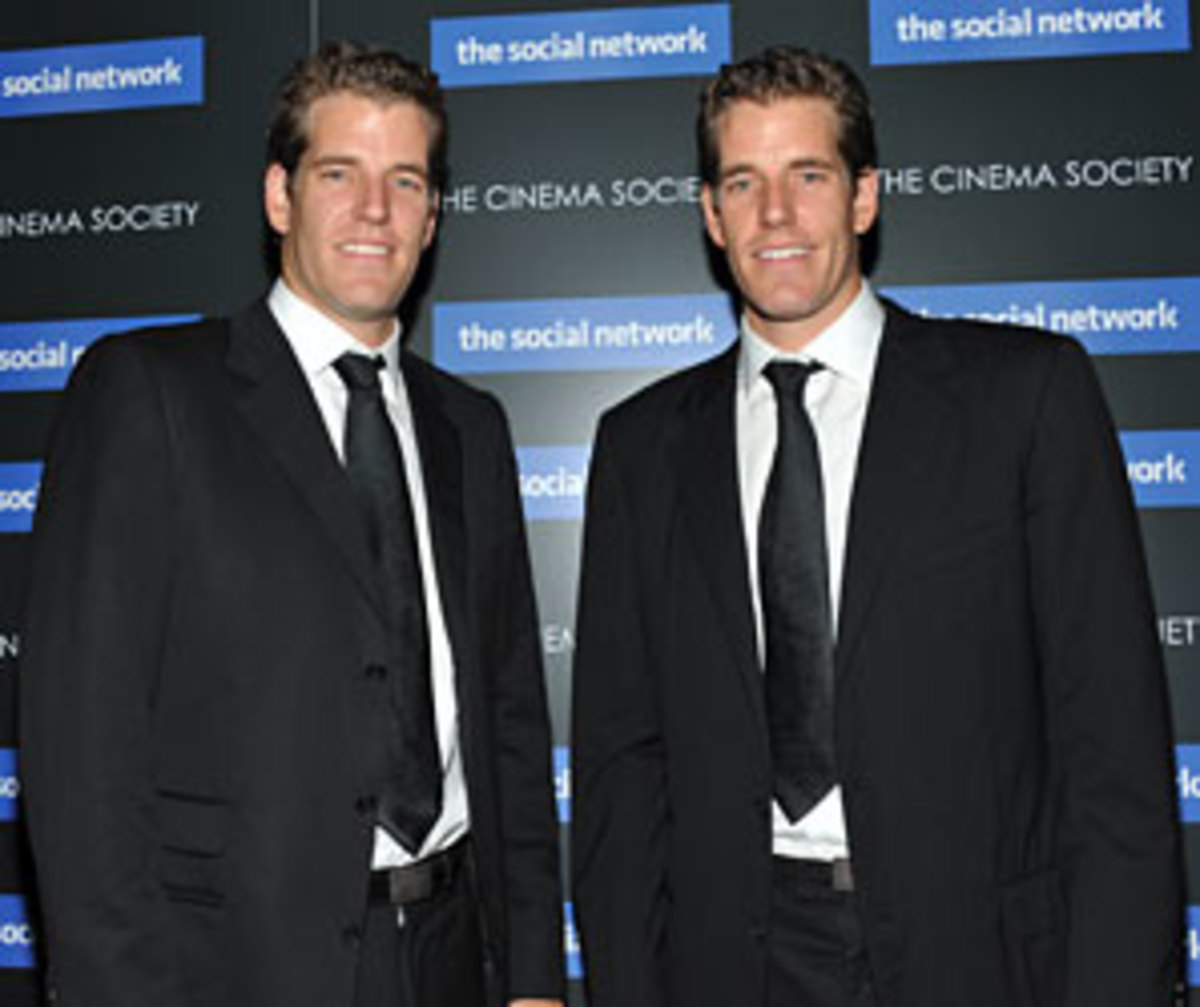Real-life rowing twins of The Social Network take aim at '12 Olympics


In addition to the expected cluster of cast members, random celebrities (Kevin Spacey, Adrien Brody, Gina Gershon), and assorted hangers-on, a pair of Olympic athletes were present for last week's New York premiere of The Social Network. Of course, Cameron and Tyler Winklevoss had a particularly compelling reason to attend the festivities: The 29-year-old twins, who finished sixth in the coxless pair crew event at the 2008 Beijing Summer Games, were Harvard undergrads when they created the social networking site ConnectU.
Odds are you know the rest of the story: they hired an ambitious, tech-savvy, awkward classmate, Mark Zuckerberg, to help with the database work. Zuckerberg turned around and improved/appropriated the code, dropped out of Harvard after his sophomore year and launched Facebook, a company now valued at anywhere from $15-33 billion. This (a)morality tale -- classic themes of ambition, hubris and betrayal mixed with modern technology -- forms the movie's central plot.
The Winklevoss twins -- "near-comically-perfect supermen," in the words of the New York Times reviewer -- are steadfast in their claim that Zuckerberg ripped off their idea and then prevented them from launching their site in full. "We stand by the fact that Mark betrayed us, he sabotaged us and our execution," says Tyler, 29. "We never could have seen this coming." Zuckerberg has repeatedly stated that two social networks are different. Whereas the Winklevoss twins' network stressed dating, Zuckerberg's focused on networking.
Though remarkably balanced and nuanced, The Social Network still seems to suggest that the twins -- as well as their partner Divya Narendra -- are the aggrieved parties in the dispute. Yet by most measures, they've still managed to do okay for themselves. Apart from settling a 2004 lawsuit against Zuckerberg for a reported $65 million and recently earning MBA's at Oxford, they've established themselves as two of the world's best oarsmen. Members of the U.S. team, they both reside in Princeton, N.J., where they rain at the National Center. Though they are sitting out the upcoming 2010 World Rowing Championships in New Zealand, both are like to be in boats at the 2012 Olympics in London.
For all the homilies about the "life lessons" sports imparts, the twins are beleivers. "No question we used a lot of the lessons from sports to overcome a pretty big challenge," says Tyler. "If you have a bad practice or lose a race or feel you didn't compete as well as you should, you can't dwell on that because you're not looking ahead and only hurting yourself. Same here. Anger and bitterness won't push the ball forward in terms of pursuing what's right, fixing what's wrong."
Crew demands inordinate rations preparation and patience. Like all Olympic scullers, the twins devoted years of their life to what amounts to a six-minute race. This, they found, replicates the rhythms of litigation, years of documents and deposition and strategizing all culminating with one high-stakes trial.
If sports helped them deal with the dispute, the dispute may also have helped their athletic careers. Rowing was a welcome outlet after a day spent racking up legal bills or a day simply spent feeling betrayed. There are worse ways to alchemize anger than by jumping in a boat and carving up the water. Friends have even made the point that had the twins launched their own successful social network, who knows if they would ever have made the Olympics?
A status update: The twins are now appealing the settlement, contending they weren't given an accurate valuation of the company when they made the agreement. They also plan to introduce evidence that Zuckerberg was dealing in bad faith. (According to the technology website Silicon Alley Insider, Zuckerberg once sent a friend an instant message about his plans for dealing with the Winklevoss twins and their venture. ZUCK: yea i'm going to f*$# them )
"We're talking about two families against a $30 billion corporation, with unlimited resources," says Tyler. "They'll try every technicality and procedure, and try to resist at any cost ... but we feel like if we let it go, this is how businesses will behave and we can't let that happen."
Tyler and Cameron, both of them 6-5, are portrayed in the movie by Josh Pence and Arnie Hammer, respectively. Kind of. Director David Fincher uses digital sleight of hand to cast Hammer as both twins, but uses Pence as a body double. Then Hammer's face is placed on Pence's body. Whatever, both twins hit the "like" icon on the movie. "In my opinion, it's a generational movie," says Tyler. "It reflects the public record accurately, but also shows [the Facebook dispute] from different perspective. Really, an excellent movie." Some knew that already. Several weeks ago, Tyler posted a trailer for The Social Network ... on his Facebook page.
